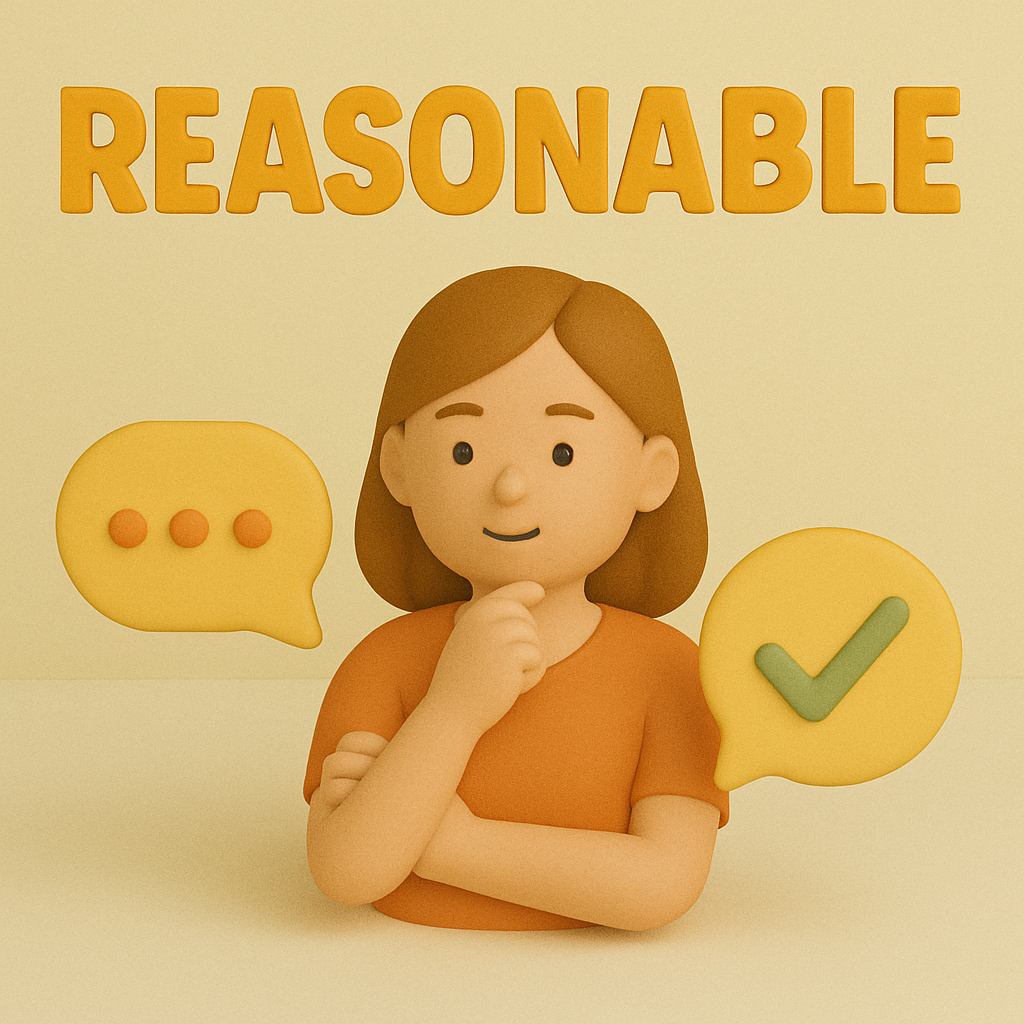Reasonable
Definition
Reasonable is an adjective that describes something as fair, practical, or based on sound judgment. It can also refer to something that is moderate or not excessive.
Parts of Speech
- Adjective
Pronunciation
American English
- IPA Pronunciation: /ˈriː.zən.ə.bəl/
- Respelling: REE-zuh-nuh-buhl
British English
- IPA Pronunciation: /ˈriː.zən.ə.bəl/
- Respelling: REE-zuh-nuh-buhl
Etymology
The word "reasonable" originates from the Latin "rationabilis," meaning "rational" or "sensible," derived from "ratio," meaning "reason." It entered Middle English through Old French in the 14th century.
Derivatives
- Reasonably (adverb)
- Reasonableness (noun)
- Unreasonable (adjective)
- Unreasonably (adverb)
- Overreasonable (adjective, rare)
Synonyms
- Fair
- Sensible
- Moderate
Antonyms
- Unreasonable
- Excessive
- Illogical
Usage
The term "reasonable" is often used to describe judgments, expectations, or actions that are fair or logical. Examples include "The lawyer provided a reasonable explanation" and "The price of the car was quite reasonable."
Related Terms
- Rational: Based on logic or reason.
- Fair: Free from bias or injustice.
- Moderate: Not excessive or extreme.
Detailed Definitions
Adjective
- Fair and sensible: Refers to judgments or actions based on sound logic or practicality.
- Example: "It is reasonable to expect students to complete their homework."
- Moderate or not excessive: Refers to something within acceptable limits.
- Example: "The store offers reasonable prices for high-quality goods."
- Capable of reasoning: Refers to a person's ability to think logically or make fair decisions.
- Example: "She is a reasonable individual who listens to all sides before deciding."
reasonable



🇨🇳 Mandarin
- 合理 (hélǐ) - fair and sensible
- IPA Pronunciation: /xɤ˥˩ li˧˥/
- English Respelling: he-li
- 适中 (shìzhōng) - a price that is not too expensive
- IPA Pronunciation: /ʂʐ̩˥˩ ʈʂʊŋ˥/
- English Respelling: shi-zhong
🇮🇳 Hindi
- उचित (uchit) - fair and sensible
- IPA Pronunciation: /ʊtʃɪt/
- English Respelling: u-chit
- सस्ता (sasta) - a price that is not too expensive
- IPA Pronunciation: /səst̪aː/
- English Respelling: sa-sta
🇪🇸 Spanish
- Razonable - fair and sensible, a price that is not too expensive
- IPA Pronunciation: /raθoˈnable/ (Spain), /rasoˈnable/ (Latin America)
- English Respelling: ra-tho-nah-ble (Spain), ra-so-nah-ble (Latin America)
🇫🇷 French
- Raisonnable - fair and sensible, a price that is not too expensive
- IPA Pronunciation: /ʁɛzɔnabl/
- English Respelling: rez-on-ahbl
🇸🇦 Modern Standard Arabic
- معقول (ma'qool) - fair and sensible
- IPA Pronunciation: /maʔ'quːl/
- English Respelling: ma'-qool
- مناسب (munasib) - a price that is not too expensive
- IPA Pronunciation: /muː'næsib/
- English Respelling: moo-nasib
🇧🇩 Bengali
- যৌক্তিক (jauktik) - fair and sensible
- IPA Pronunciation: /d͡ʒaukt̪ik/
- English Respelling: jauk-tik
- সস্তা (sosta) - a price that is not too expensive
- IPA Pronunciation: /ʃosʈa/
- English Respelling: sho-sta
🇷🇺 Russian
- Разумный (razumnyy) - fair and sensible
- IPA Pronunciation: /ˈrazʊmnɨj/
- English Respelling: ra-zum-ny
- Недорогой (nedorogoy) - a price that is not too expensive
- IPA Pronunciation: /nʲɪdɐˈroɡoj/
- English Respelling: ne-do-ro-goy
🇵🇹 Portuguese
- Razoável - fair and sensible, a price that is not too expensive
- IPA Pronunciation: /ʁɐzɔˈavɛl/
- English Respelling: ra-zo-a-vel
🇮🇩 Indonesian
- Wajar - fair and sensible
- IPA Pronunciation: /wad͡ʒar/
- English Respelling: wa-jar
- Murah - a price that is not too expensive
- IPA Pronunciation: /mu.ra/
- English Respelling: moo-rah
🇩🇪 German
- Vernünftig - fair and sensible
- IPA Pronunciation: /fɛɐ̯ˈnʏnftɪç/
- English Respelling: fer-nunft-ig
- Preiswert - a price that is not too expensive
- IPA Pronunciation: /ˈpʁaɪsˌvɛʁt/
- English Respelling: prise-vert
🇯🇵 Japanese
- 合理的 (gouriteki) - fair and sensible
- IPA Pronunciation: /ɡoːɾite̞ki/
- English Respelling: go-ri-te-ki
- 手頃な (tegirona) - a price that is not too expensive
- IPA Pronunciation: /te̞ɡiɾona/
- English Respelling: te-gi-ro-na
🇻🇳 Vietnamese
- Hợp lý - fair and sensible
- IPA Pronunciation: /hɔ̌p li˨˩/
- English Respelling: hop ly
- Rẻ - a price that is not too expensive
- IPA Pronunciation: /ʐɛ˧˨/
- English Respelling: ze
🇰🇷 Korean
- 합리적인 (haplijjeogin) - fair and sensible
- IPA Pronunciation: /hapʎit͡ɕʌɡin/
- English Respelling: hap-li-jjeo-gin
- 저렴한 (jeoryeomhan) - a price that is not too expensive
- IPA Pronunciation: /t͡ɕʌrjʌmhan/
- English Respelling: jeo-ryeom-han
🇹🇷 Turkish
- Mantıklı - fair and sensible
- IPA Pronunciation: /mantɯkli/
- English Respelling: man-tik-li
- Ucuz - a price that is not too expensive
- IPA Pronunciation: /ud͡ʒuz/
- English Respelling: u-juze
🇵🇰 Urdu
- مناسب (munasib) - fair and sensible
- IPA Pronunciation: /muː'næsib/
- English Respelling: moo-nasib
- سستا (sasta) - a price that is not too expensive
- IPA Pronunciation: /səst̪aː/
- English Respelling: sa-sta





